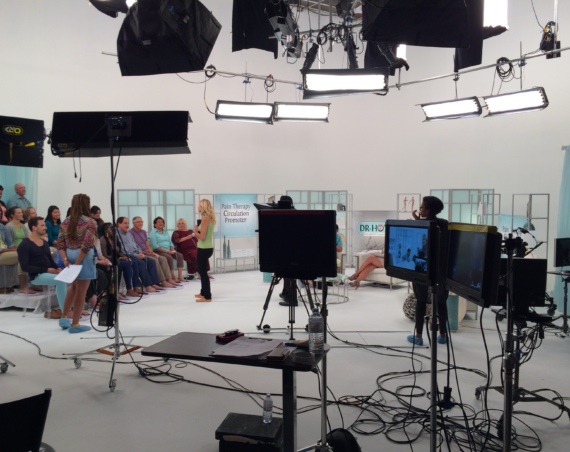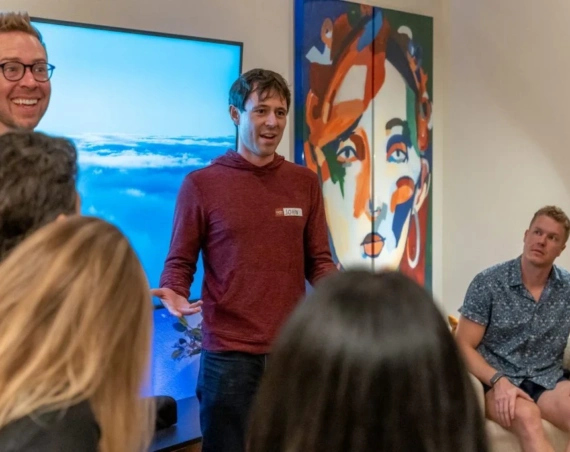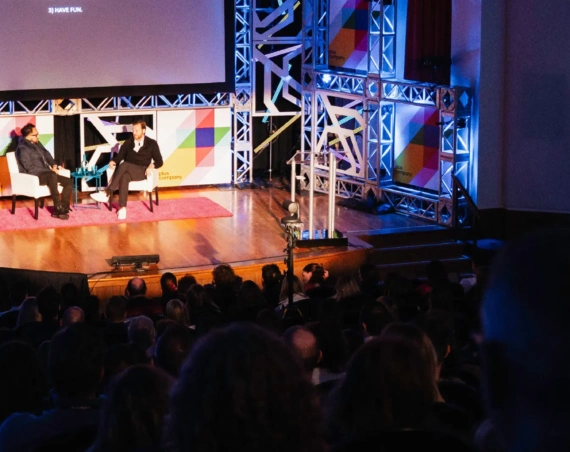Venice-based AMPLIFY has been on a tear.
Just this week alone, Amplify announced Seed Rounds for three of its portfolio companies — smartwatch app studio Little Labs ($3M), self-storage service Clutter ($2M), and eSports company AlphaDraft ($5M).
The accelerator, opened in 2012, has fostered a strong base of LA tech companies, and continues to grow as the area’s fortunes rise as well.
And even though Amplify has only been open for a few years, the groundwork laid down by founding partner Paul Bricault was decades in the making.

Amplify co-founders Paul Bricault, Oded Noy, Richard Wolpert
Bricault, a USC grad who spent 15 years at William Morris, was first approached by LA Deputy Mayor Steve Sugarman in 1999 to build a first-of-its-kind accelerator as a means to keep local talent from fleeing to San Francisco’s booming tech scene.
Bricault and his team had the business plan written. They had the funding secured, they even had the office, a building donated by an area real estate business. They were all good to go on paper.
And then the bubble burst.
“But that was the first seed, that, hmm, LA should have an accelerator,” says Bricault, who proceeded to get more deeply involved in the VC space, forming the Mailroom Fund out of William Morris with AT&T and Accel.
But it was nearly a decade later that Amplify began its genesis, when during a 2008 meeting, Mailroom Fund board member Jim Breyer asked, “‘Why isn’t there an accelerator in LA?’ You could throw a stick and hit ten of them in San Francisco, and yet there aren’t any of any size or scale in LA, except for the grandaddy of them all, [Bill Gross’s Pasadena-based incubator] Idealab.”
Thus set Bricault on his journey, visiting a dozen or so accelerators and incubators in San Francisco, New York, even Cincinnati, Dallas, and Canada in the years following.

Things really came together when Bricault met TrueCar co-founder and CTO Oded Noy, who had decided he wanted to help LA entrepreneurs spawn companies as Amplify’s co-founder and CTO.
Noy had also recently founded the Southern California CTO Forum, and realized the importance of connecting tech talent to promising companies in the region.
Bricault & Noy put together a plan, found the Windward Circle building, wrangled fellow Amplify co-founders Richard Wolpert and Jeff Solomon, and secured funding from Greycroft & Accel in 2010, which lead to funding from others soon after. They ran Amplify near the Third Street Promenade before settling into Amplify’s built-out Venice space in September 2012.
Fast-forward to 2015, and Amplify is firing on all cylinders: Harvard Business Review recently named Amplify one of the Top 10 Accelerators in the nation. Graduating companies have announced funding rounds. Other area accelerators have either shut down or shifted their focus, and LA itself has earned its place in the spotlight as a top market for startups and technology.

Today, Amplify is accelerating 14 companies in-house, and receives as many as 400 submissions a week.
Says Bricault of the process, “The nature in how we filter companies hasn’t changed, but the bar has gone up. In the early part of Amplify there were a couple startups we admitted that were literally an idea on paper.
“Now we’ve got companies coming in that are doing a hundred thousand a month in revenue, or, a site launched / generating revenue / had user traction, or if it’s a SAAS company, a site is launched / companies using the product, so now we have more to look at.”
The terms have changed as well — instead of offering $25,000 for 6% like a lot of accelerators did in Amplify’s early days, Amplify offers a range between $50,000-$250,000 to allow for flexibility based on a number of variables related to each company’s valuation, such as its founders’ experiences, if / how much capital has already been raised, and the size of its potential business.
Amplify also has an informal non-class cadence, since the companies Amplify brings in these days are all at various stages in their growth. Says Bricault, “It doesn’t work to teach the ABCs of raising capital when they already have a Seed Round.”
Instead, Amplify has speakers come in every Wednesday night, lunch & learns on various topics customized to best fit Amplify’s current portfolio blend, and a deep bench of 115 mentors who hold office hours on a rotating basis.
Director of Operations Chris Olson provides status reports from weekly / biweekly check-ins, and monthly milestone meetings help everyone measure progress, plus seek additional help if anyone is missing scheduled benchmarks. Amplify also has an open door policy for current and past portfolio companies that need help on specific events that require immediate attention.

Among recent events experienced by Amplify alumni, RadPad announced a $9 million Series A in April 2015, Vadio recently closed a $7.5 million Series A, and Hello Tech announced a $3 million Seed Round at the beginning of the year.
The Bouqs set up shop along Washington Boulevard, Gem opened down the street on Abbot Kinney, and StackCommerce moved a couple blocks away to Market Street.

Current in-house companies include instant help app Sensay, audience monetization service Fanbread, and map tech firm Tallygo, which is working with the Mayor’s office on their Open Data initiatives.
See the full list of Amplify portfolio companies here
When it comes to the types of companies that Amplify accepts, say Bricault, “We’re always opportunistic, we try to have a certain degree of blend, but there’s not any boxes to check that, ‘We must have one of these of companies.’
“When certain trends come up, or platform changes in the marketplace that suggest an opportunity [such as Cryptocurrency in 2014, Internet of Things, E-Sports, or Virtual Reality], we tend to see an uptick in applications. But some of the more traditional, secure sectors such as Ad Tech, E-Commerce, and FinTech have a consistent number of applications over time.”
The geographic base has also evolved — 90% of Amplify’s earliest companies were SoCal based, whereas now that number is closer to 65%, with Amplify’s portfolio of 44 total companies having come from 14 states, plus 4 from outside the US.
Bricault notes a number of influences that have helped LA grow, which has also fostered Amplify’s growth: First, the number of Seed Funds has increased 3-4x in the past three years, which has made it easier for entrepreneurs to raise money, and stay, in LA.
“It’s much easier to leave a place if the very first round has to be raised elsewhere. But if you raise your Seed Round here and hire out your core team, then by the time you get to your A, then you’re like, ‘We’ve got roots established here, I’ve got two programmers who have a wife and kids that go to school and it’s hard for us to leave and we have existing investors who are reupping.’”

Because these companies are gaining traction, Bricault notes that a lot of their portfolio companies are starting to see funding come from firms outside the area, who are being drawn to LA’s overall tech scene.
And while the Seed Capital has exponentially grown, the number of firms funding Series A’s have seen a modest uptick, noting recent raises by Upfront, Greycroft, Altpoint, Sierra Wasatch, and March Capital.
Due to the size of LA’s VC scene (as well as certain funds’ mandate thresholds), “People share a lot of deals here, so you need to syndicate — that’s created a collaboration mentality, partially out of necessity.”
Bricault also acknowledges LA’s education / business / government ecosystem in helping the region’s tech scene come into its own:
LA’s incredible universities, including USC, UCLA, CalTech, Harvey Mudd, and others, are developing a vast pool of talent, with more students each year likely to stick around and work for an LA-based company, or start up their own business, upon graduation.
Next is the current business atmosphere, which has allowed companies like Snapchat and Factual to set up shop down here, noting that competition for top engineering talent can be challenging, but not quite as cutthroat as it is up north.
And third is Mayor Eric Garcetti’s early numerous outreach efforts, and day-one dedication to LA’s tech scene, as important to promoting LA as a city where businesses can succeed.
“We have an incredible education base here, not just engineering and technical talent, but also entrepreneurial talent that normally would have gone into the entertainment field, finding a robust and thriving startup ecosystem in LA.”




